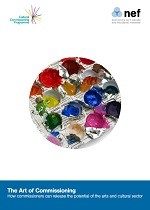The art of commissioning
How commissioners can release the potential of the arts and cultural sector
15 May 2016
The arts and culture sector has an important role to play in our public services.
Whether it’s improving health and well-being through arts activities which engage people physically and emotionally, or using cultural organisations to build stronger communities, innovative new schemes across the UK are paving the way to improved outcomes for people and communities, and better value for money for commissioners.
Local authorities and health services face a challenging combination of budget cuts and mounting demands on public services.
Such challenges can be met through a new model of public services – one that is built on preventing harm and reducing people’s need for acute services, without compromising the wellbeing of the individuals and communities who rely on them.
Arts and cultural organisations have much to offer the commissioners of public services. Many are finding new ways of using arts and cultural activities within services for mental and physical health, early intervention, environmental services and support for older people, among other areas.
These activities offer new ways of engaging and supporting people, and are delivering on policy goals that aim to prevent acute needs arising, integrate services around the person, improve individual and community well-being, and ensure public services deliver a wider range of social, environmental and economic outcomes.
However, arts and cultural organisations have long been overlooked by commissioners of public services. This is because commissioning can often be focused on more traditional models of service provision, and procurement documents can be so highly specified that they leave little room for innovation in how organisations meet the outcomes that people and commissioners want.
The Cultural Commissioning Programme (CCP), funded by Arts Council England, seeks to help commissioners of public services understand how they can improve outcomes by integrating arts and cultural activities into a range of services, including mental health and wellbeing, older people and place-based commissioning. It also works with the arts and cultural sector to support knowledge and skills, and to strengthen relationships with policymakers, public service leaders and commissioners. It is delivered by National Council for Voluntary Organisations (NCVO), in partnership with the New Economics Foundation (NEF) and New Philanthropy Capital (NPC).
As part of the CCP, NEF has worked with NHS and local authority partners in Kent and Gloucestershire over an 18 month period. This report brings together experiences and lessons from these two pilot sites, sharing practical examples of how arts and cultural organisations can be engaged to improve the quality and value of public services, and how commissioners can overcome some of the common barriers they face.
In Gloucestershire, the NHS Gloucestershire Clinical Commissioning Group has funded nine projects that are applying arts and culture across a range of clinical pathways including cancer, mental health and diabetes. They are also exploring how arts and cultural activities can be aligned with the county wide social prescribing scheme.
In Kent, the County Council has developed a range of new services that included arts and cultural organisations, alongside traditional public service providers. These including a £4 million community-based mental health service which includes formal arts and cultural organisations, such as local museums and theatres, as well as smaller, informal arts and cultural groups, such as reading groups and dance classes. The early insights from Kent’s work show that by changing the commissioning process, innovative and community based solutions can help people access a better range of support in their communities, and that arts and cultural organisations are an important part of this picture.
Kent County Council has also been involving arts and cultural organisations in their early help and preventative service worth around £8 million, and the re-commissioning of Kent’s £50 million waste management service.
These pilot sites have highlighted the specific challenges that the arts and culture sector faces when up against traditional service providers. These include:
- an approach to purchasing or procuring services that isn’t fit for purpose;
- overly defined service specifications;
- not being included in engagement events;
- ‘the burden of proof’ that new providers face, which existing organisations often don’t have to meet.
Our work with Kent and Gloucestershire has shown that public service commissioners can make important changes to remove these barriers and realise the benefits that the arts and cultural sector can offer. These include:
- Raising awareness about the value of arts and culture within local government and the NHS;
- Building the capacity of arts and cultural organisations to bid for public sector work;
- Building relationships with arts and cultural organisations, and engaging with this sector at a strategic level;
- Changing procurement to better engage arts and cultural organisations;
- Changing monitoring and evaluation approaches to focus more on outcomes.
The arts and cultural sector offers huge potential for our public services. Commissioners should use the practical evidence in this report to make the most of such enormous opportunity.







